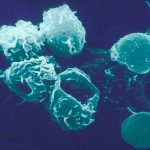Link to Pubmed [PMID] – 19617548
Proc. Natl. Acad. Sci. U.S.A. 2009 Jul;106(30):12453-8
Some gammadelta and alphabeta T lymphocytes exhibit an “innate” phenotype associated with rapid cytokine responses. The PLZF transcription factor is essential for the innate phenotype of NKT cells. This report shows that PLZF is likewise responsible for the innate, NKT-like phenotype of Vgamma1+Vdelta6.3/Vdelta6.4+ cells. TCR cross-linking induced PLZF expression in all polyclonal immature gammadelta thymocytes, suggesting that agonist selection might be required for PLZF induction. Transgenic expression of Vgamma1Vdelta6.4 TCR was sufficient to support the development of large numbers of PLZF+ T cells, further supporting the importance of the TCR for PLZF induction. Interestingly, expression of this TCR transgene led to the development of spontaneous dermatitis.

